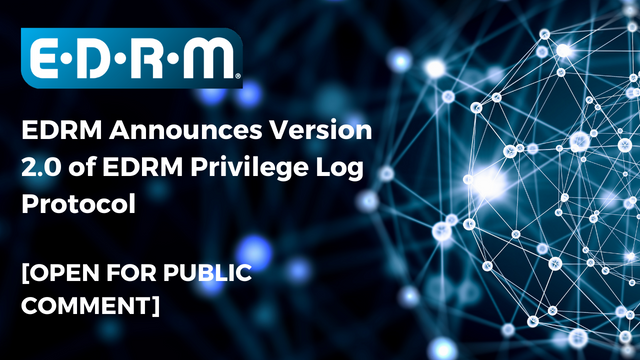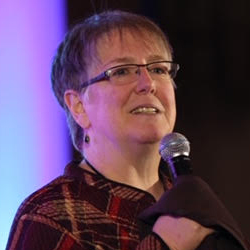
MINNEAPOLIS, MN, USA, February 1, 2023 /EINPresswire.com/ — Setting the global standards for e-discovery, the Electronic Discovery Reference Model (EDRM) is pleased to announce Version 2.0 of the EDRM Privilege Log Protocol for public comment. Comments will be accepted through March 1, 2023. It has been estimated that document review is 70% of eDiscovery costs, with privilege review and logging the most expensive component of review. The mission of this protocol is to save time, and costs for both sides of a litigation and those adjudicating the disputes.
Current privilege log practice no longer furthers—and, in fact, now hinders—the goals of just, speedy, and inexpensive resolution of litigation; thus, reform is required. The EDRM privilege log protocol represents an important step towards improving the current status quo. Importantly, the protocol was developed using a consensus approach involving attorneys representing both responding and requesting parties.
Robert Keeling, Partner at Sidley Austin
Robert Keeling, a partner at Sidley Austin, noted that “privilege log rules that may have worked in a paper world simply are not equipped to handle the massive volume of electronically stored information (“ESI”) that legal practitioners must handle during discovery today. Current privilege log practice no longer furthers—and, in fact, now hinders—the goals of just, speedy, and inexpensive resolution of litigation; thus, reform is required. The EDRM privilege log protocol represents an important step towards improving the current status quo. Importantly, the protocol was developed using a consensus approach involving attorneys representing both responding and requesting parties.”
The recent revisions to the EDRM’s privilege log protocol reflects a balanced perspective – recognizing the needs and challenges of both requesting and producing parties. We aimed to design a fair process that would satisfy the purpose of Rule 26(b)(5)(A) and minimize unnecessary disputes down the road. We hope this protocol serves as a helpful resource as parties work collaboratively to determine a privilege log process that is right for their litigation.
Lea Bays, of counsel at Robbins Geller Rudman & Dowd LLP
Privacy and security enabled eDiscovery technology and services will play a central role in organizations as they strive to rebound from the current global crisis as more cohesive, more stable and more productive entities. Robust e-discovery technology, supported by expertise and services, helps organizations respond to litigation, compliance and investigation demands. In a new era of remote work at scale, organizations need to securely manage information, protect confidential and privileged access and collaborate effectively to be efficient and productive and adhere to the increasing complex demands of security and data privacy frameworks.
A project team was created under the auspices of EDRM to try to devise potential alternatives to traditional privilege logging. The project team includes lawyers who most often represent producing parties, lawyers who most often represent requesting parties, technical specialists and other professionals at law firms and service providers who regularly deal with privilege issues and privilege logs. The result is the EDRM Streamlined Privilege Protocol version 2.0.
“This was a monumental, collaborative effort among the team to take differing viewpoints and come to a consensus on a protocol that could work for both sides of the aisle. Notably, the protocol raises the important issues opposing counsel should be discussing on the front end, to avoid disputes later on. The EDRM Privilege Log Protocol is a critical tool for streamlining the manual privilege log process, which can be time consuming, burdensome and expensive. We look forward to hearing success stories from the field as the protocol is used in practice.
Cristin Traylor, director, law firm strategy marketing, Relativity, and project trustee.
“The recent revisions to the EDRM’s privilege log protocol reflects a balanced perspective – recognizing the needs and challenges of both requesting and producing parties,” said Lea Bays, of counsel at Robbins Geller Rudman & Dowd LLP. “We aimed to design a fair process that would satisfy the purpose of Rule 26(b)(5)(A) and minimize unnecessary disputes down the road. We hope this protocol serves as a helpful resource as parties work collaboratively to determine a privilege log process that is right for their litigation.”
The 15-step protocol will help lead to “the just, speedy, and inexpensive determination” of disputes, in accordance with FRCP 1, through streamlined privilege logging. It leverages enhanced communications, readily available technology and collaboration, to bring important improvements to the privilege logging and assessment process.
The Privilege Log Protocol is offered by EDRM’s Privilege Log Protocol Project team, led by Project Trustee, Cristin Traylor, director, law firm strategy marketing.
The project team for Version 2 includes (organizations listed for identification purposes):
- Lea Bays, of counsel, Robbins Geller Rudman & Dowd LLP
- David Cohen, partner, Reed Smith
- Brian Flatley, litigation support manager, Ellis & Winters
- Jeannine Kenney, partner, Hausfeld LLP
- Deborah Ketchmark, senior director, Consilio
- Brian Kish, senior consultant, United Lex
- Cristin Traylor, director, law firm strategy marketing, Relativity, trustee
- Michelle Yeary, counsel, Dechert LLP
EDRM is also grateful to the project team for Version 1:
- Project Trustee: Cristin Traylor, Director, Law Firm Strategy Marketing, Relativity
- Sub Project Chair: David Cohen, Partner, Reed Smith
- Sub Project Chair: Blake Fisher, Director, Review Solutions, Consilio LLC
- Lilith Bat-Leah, Vice President, Data Services, Digital Prism Advisors, Inc.
- Darius Bennett, Project Manager, Digital Support, Ricoh USA, Inc.
- Janet Bryan, Attorney, Geary, Porter & Donovan, P.C.
- Kelley Chaney, Senior Paralegal and eDiscovery Specialist, Lewis Brisbois Bisgaard & Smith
- Suzanne Clark, Of Counsel -Mass Torts Discovery Counsel, Beasley Allen Law Firm
- Debi Wilson Collins, Senior Project Manager, TCDI
- Brian Flatley, Litigation Support Manager, Ellis & Winters LLP
- James Jansen, Vice President and Global Lead – Cyber Response Solutions, Consilio LLC
- Deborah Ketchmark, Senior Director, Consilio LLC
- Brian Kish, Senior Consultant, UnitedLex
- Ben Kusmin, Founder, Excel Esquire; Litigation Associate, Windels Marx Lane & Mittendorf, LLP
- J. Ryan Lopatka, Partner, Kahn Swick & Foti, LLC
- Vikram Masson, Senior Vice President, Litigation, UnitedLex
- Glenn Melcher, Senior Special Counsel for eDiscovery and Information Governance, CFPB
- Timothy Opsitnick, EVP and General Counsel, TCDI
- Pearl Robertson, Partner, Irpino, Avin & Hawkins Law Firm
- Justin Scranton, Consilio LLC
- Michelle Yeary, Counsel, Dechert LLP
“This was a monumental, collaborative effort among the team to take differing viewpoints and come to a consensus on a protocol that could work for both sides of the aisle,” asserted Cristin Traylor, director, law firm strategy marketing, Relativity, and project trustee.“ Notably, the protocol raises the important issues opposing counsel should be discussing on the front end, to avoid disputes later on. The EDRM Privilege Log Protocol is a critical tool for streamlining the manual privilege log process, which can be time consuming, burdensome and expensive. We look forward to hearing success stories from the field as the protocol is used in practice.”
Companies involved in big cases—and their legal teams—know very well the tremendous time and effort that often goes into creating privilege logs, but privilege logs do little or nothing to advance the fair and correct resolution of cases. Utilizing the EDRM privilege log protocol can significantly streamline the logging process— including giving requesting parties the information they need to confirm that privilege decisions are being made in a fair and consistent manner—while substantially reducing the expenditure of time and money to achieve that goal.
David Cohen, Reed Smith partner, Chair of the EDRM Board of Project Trustees
According to David Cohen, Reed Smith partner, Chair of the EDRM Board of Project Trustees, and a member of the privilege log protocol team, this protocol will be especially useful for large scale litigation with high volumes of privileged documents: “Companies involved in big cases—and their legal teams—know very well the tremendous time and effort that often goes into creating privilege logs, but privilege logs do little or nothing to advance the fair and correct resolution of cases. Utilizing the EDRM privilege log protocol can significantly streamline the logging process— including giving requesting parties the information they need to confirm that privilege decisions are being made in a fair and consistent manner—while substantially reducing the expenditure of time and money to achieve that goal.”
Among the EDRM opportunities and resources available are the ability to connect, network and contribute via EDRM projects and events, share their expertise with our global community. The EDRM community of knowledgeable, multidisciplinary professionals is building resources to enhance e-discovery, privacy, security and information governance frameworks, processes and standards.
The EDRM community is comprised of 33% corporations, 30% law firms and 23% software and service providers, 12% governments with the remaining 2% being a mix of educators, students, judges and media in 145 countries spanning six continents.
About EDRM
Empowering the global leaders of e-discovery, the Electronic Discovery Reference Model (EDRM) creates practical resources to improve e-discovery, privacy, security and information governance. Since 2005, EDRM has delivered leadership, standards, tools and guides to improve best practices throughout the world. EDRM has an international presence in 145 countries spanning six continents and growing has an innovative support infrastructure for individuals, law firms, corporations and government organizations seeking to improve the practice and provision of data and legal discovery. Learn more about the EDRM today at EDRM.net.
About EDRM’s Privilege Log Protocol Project
A privilege log is a record of the responsive or relevant documents that are being withheld from production on a claim that they contain attorney-client communications or work-product. The purpose of the project is developing best practices that most efficiently accomplish the task, including consideration of possible rule amendments. Project Trustee is Cristin Traylor (Relativity). The project has published Version 2.0 of the EDRM Privilege Log Protocol.
Comments from the public are welcomed until March 1, 2023.
Contact info@edrm.net for more information on how to get involved in our global project community.
Read the press release here.
EDRM Media Contact
Kaylee Walstad
Chief Strategy Officer, EDRM
+1 612-804-3244
kaylee@edrm.net


